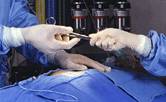- 7 Best Breads for Maintaining Stable Blood Sugar
- Gelatin vs. Collagen: Which is Best for Skin, Nails, and Joints?
- The Long-Term Effects of Daily Turmeric Supplements on Liver Health
- Could Your Grocery Store Meat Be Causing Recurring UTIs?
- Are You Making This Expensive Thermostat Error This Winter?
- Recognizing the Signs of Hypothyroidism
- 10 Strategies to Overcome Insomnia
- Could Artificial Sweeteners Be Aging the Brain Faster?
- Techniques for Soothing Your Nervous System
- Does the Water in Your House Smell Funny? Here’s Why
Most of World’s People Lack Access to Safe Cancer Surgery: Report


Most cancer patients worldwide don’t have access to needed surgeries, a new study finds.
More than 80 percent of the 15 million people diagnosed with cancer in 2015 will require an operation, but fewer than a quarter of them will have access to safe and affordable surgical care.
In low-income countries, as many as 95 percent of cancer patients do not receive basic cancer surgery, according to the findings of a new commission examining the state of global cancer surgery. The findings were published Sept. 27 in The Lancet Oncology and are to be presented simultaneously at the European Cancer Congress in Vienna.
“With many competing health priorities and substantial financial constraints in many low- and middle-income countries, surgical services for cancer are given low priority within national cancer plans and are allocated few resources. As a result, access to safe, affordable cancer surgical services is dismal,” commission leader Richard Sullivan said in a journal news release. Sullivan is with the Institute of Cancer Policy at King’s College London in Great Britain.
“Our new estimates suggest that less than one in 20 (5 percent) patients in low-income countries and only roughly one in five (22 percent) patients in middle-income countries can access even the most basic cancer surgery,” he said.
Without immediate investment in surgical services, global economic losses from cancers that could have been treated surgically will hit $12 trillion by 2030, the report showed. Failure to train more cancer surgeons and improve surgical systems will cost more than $6 trillion by 2030.
More than 80 percent of cancers require surgery and nearly 300 surgical procedures are used to diagnose, treat or cure cancers, the report found.
By 2030, the researchers project that more than 17 million new cancer patients will require surgery.
“The global community can no longer ignore this problem,” study co-author C.S. Pramesh, head of thoracic surgery at Tata Memorial Centre in Mumbai, India, said in the news release.
“By 2030, 45 million operations a year will be needed worldwide. The situation is particularly dire in low-income countries in sub-Saharan Africa and Asia where the need for cancer surgery is projected to increase by around 60 percent between now and 2030,” Pramesh said.
The commission also said that one-third of people with cancer in low-income countries who have cancer surgery will incur costs that drive them into poverty, and another one-quarter will stop treatment because they can’t afford it.
More than 82 percent of countries have a serious shortage of cancer surgeons, and only 1.3 percent of global spending on cancer research and development is for surgery, the report found.
“This commission clearly outlines the enormous scale of the problem posed by the global shortfall in access to cancer surgery and current deficiencies in pathology and imaging. The evidence outlined by the commission, contributed by some of the world’s leading experts in the field, leaves no doubt of the dire situation we are facing,” Sullivan said.
“It is imperative that surgery is at the heart of global and national cancer plans. A powerful political commitment is needed in all countries to increase investment and training in publicly funded systems of cancer surgery,” he concluded.
More information
The American Cancer Society has more about cancer surgery.
Source: HealthDay
Copyright © 2026 HealthDay. All rights reserved.










